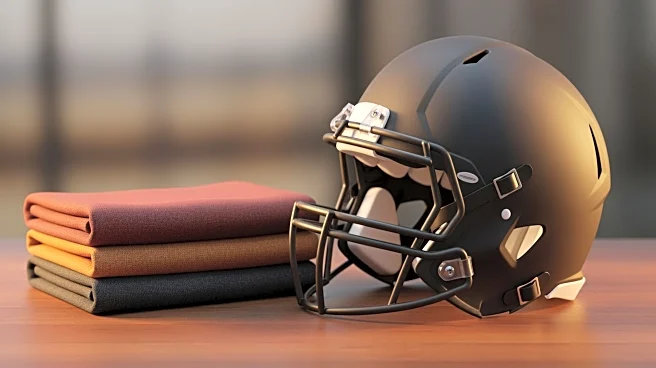What's Happening?
Julian Lewis, a former five-star true freshman quarterback for Colorado, recently made his first start against West Virginia, where he completed 22 of 35 passes for 299 yards and two touchdowns. Despite
the team's loss, Lewis's performance marked a significant improvement in Colorado's quarterback play. In addition to his on-field activities, Lewis has launched a new clothing line, available on jujulewis10.com, featuring items like t-shirts, hats, hoodies, and athletic shorts branded with his 'JL' logo. Lewis is familiar with NIL deals, having previously partnered with brands like Starbucks, Gym Weed, and Taco Bell, and boasts an NIL valuation exceeding $1 million.
Why It's Important?
Lewis's emergence as a promising quarterback and his entrepreneurial venture come at a crucial time for the Colorado Buffaloes, who are experiencing a challenging season. The team, which had a 9-4 record in 2024, has struggled this year, losing key players and facing a series of defeats. Lewis's performance and business endeavors provide a glimmer of hope for fans and stakeholders, potentially boosting morale and interest in the program. His NIL success highlights the growing influence of college athletes in business and marketing, reflecting broader trends in collegiate sports.
What's Next?
Colorado has two games remaining in the season, with a matchup against Arizona State next Saturday. While the team is out of bowl contention, there is still motivation to finish strong, especially with Athletic Director Rick George transitioning to an advisory role and Coach Deion Sanders facing health challenges. A positive end to the season could bolster future optimism and stabilize the program, particularly with Lewis as a focal point. The upcoming games offer an opportunity for Lewis to further establish himself as a key player and for the team to regain some momentum.
Beyond the Headlines
Lewis's business venture underscores the evolving landscape of college athletics, where players increasingly leverage their personal brands for financial gain. This shift raises questions about the balance between sports and business for student-athletes and the potential impact on their academic and athletic commitments. As NIL deals become more prevalent, institutions may need to adapt their policies to support athletes in managing these opportunities while maintaining focus on their primary roles as students and competitors.








